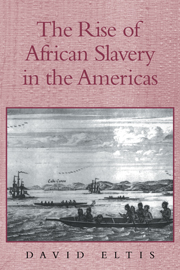Book contents
- Frontmatter
- Contents
- List of Tables
- List of Maps
- Preface
- Abbreviations
- Chapter 1 Slavery and Freedom in the Early Modern World
- Chapter 2 The English, the Dutch, and Transoceanic Migration
- Chapter 3 Europeans and African Slavery in the Americas
- Chapter 4 Gender and Slavery in the Early Modern Atlantic World
- Chapter 5 Productivity in the Slave Trade
- Chapter 6 Africa and Europe in the Early Modern Era
- Chapter 7 The African Impact on the Transatlantic Slave Trade
- Chapter 8 The English Plantation Americas in Comparative Perspective
- Chapter 9 Ethnicity in the Early Modern Atlantic World
- Chapter 10 Europe and the Atlantic Slave Systems
- Epilogue on Abolition
- Appendices
- Maps
- Sources and Bibliography
- Index
Chapter 8 - The English Plantation Americas in Comparative Perspective
Published online by Cambridge University Press: 05 August 2012
- Frontmatter
- Contents
- List of Tables
- List of Maps
- Preface
- Abbreviations
- Chapter 1 Slavery and Freedom in the Early Modern World
- Chapter 2 The English, the Dutch, and Transoceanic Migration
- Chapter 3 Europeans and African Slavery in the Americas
- Chapter 4 Gender and Slavery in the Early Modern Atlantic World
- Chapter 5 Productivity in the Slave Trade
- Chapter 6 Africa and Europe in the Early Modern Era
- Chapter 7 The African Impact on the Transatlantic Slave Trade
- Chapter 8 The English Plantation Americas in Comparative Perspective
- Chapter 9 Ethnicity in the Early Modern Atlantic World
- Chapter 10 Europe and the Atlantic Slave Systems
- Epilogue on Abolition
- Appendices
- Maps
- Sources and Bibliography
- Index
Summary
Initially, the english faced the same dilemma as other Europeans in seeking to create transoceanic empires. For those with little property, lightly populated territories represented an opportunity to acquire land and independence from others – a chance to avoid wage slavery in Christopher Hill's characterization. The high cost of transatlantic travel, however, prevented the mass migration of individuals free of obligations to others before the nineteenth century. For the propertied classes (in other words, from an imperial perspective) transatlantic land was useful only if trade and labor supplies were possible. As noted in Chapter 5, shipping costs before 1650 were such that only the highest-value produce could be traded. Even if commodities were stolen or pirated, they still had to be carried to a market; if that market was across the Atlantic then their value would have to exceed at minimum the cost of transportation. Atlantic trade and empires could be based on plunder, exchange with indigenous populations (for example, gold from West Africa), or production within a new colony, but in each case the product had to warrant shipping. Individuals working by themselves or with family members on their own plot of land did not normally produce high-value products. Given the failure of Europeans to establish plantations in Africa described in Chapter 6, the third of these options, production for export, thus meant one group working for another – initially Europeans working for Europeans, at least outside Iberian America.
- Type
- Chapter
- Information
- The Rise of African Slavery in the Americas , pp. 193 - 223Publisher: Cambridge University PressPrint publication year: 1999



